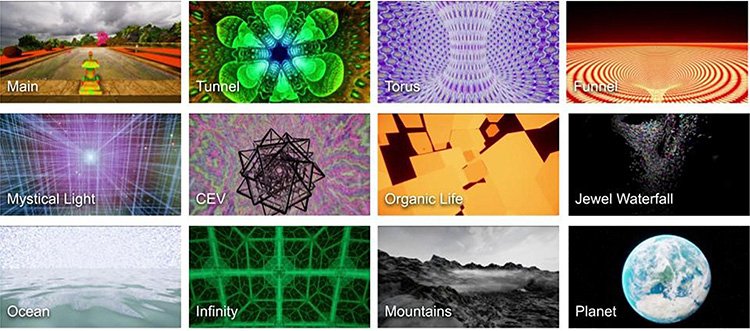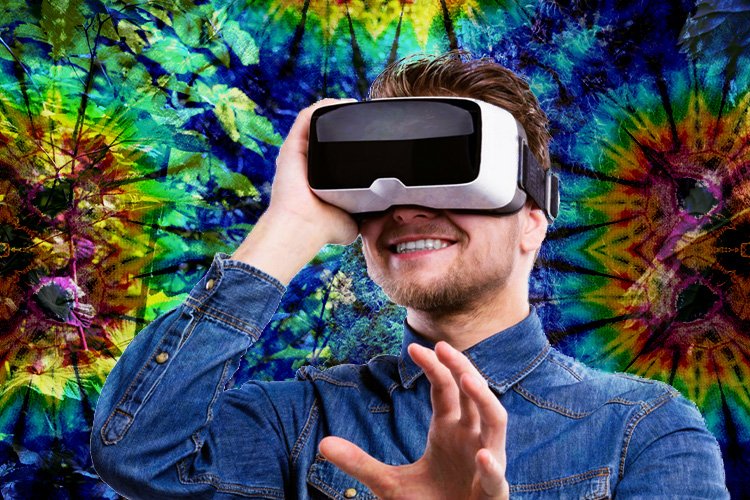Virtual reality (VR) technology has come a long way in recent years. Beyond just gaming and entertainment, researchers are now exploring how VR might be used to revolutionize healthcare and the treatment of mental disorders.
In one such example, researchers from Estonia say they have developed a groundbreaking VR experience called “Psyrreal,” which simulates the subjective effects and phenomenological components of psychedelic experiences.
The researcher’s goal was to see if VR could replicate the therapeutic benefits of psychedelic-assisted therapy for treating mental health disorders without ingesting hallucinogenic drugs.
Ultimately, results showed that after a 2-day therapy session using Psyrreal, participants suffering from mild-to-moderate depression showed significant decreases in depressive symptoms.
This novel use of virtual reality to replicate the therapeutic effects of psychedelics has the potential to revolutionize mental health treatment and make psychedelic-assisted therapy more accessible to people worldwide.
As significant, researchers have made Psyrreal freely available, so now anyone can try out a simulated virtual trip for themselves.
Psychedelic drugs such as psilocybin (found in magic mushrooms) and LSD have shown great promise in treating many mental health disorders, including depression, anxiety, PTSD, and addiction.
Proponents of psychedelic therapy say concerns over the use of hallucinogenic drugs stem from “urban legends,” unscientific studies conducted in the 1940s-1970s, and “very rare” instances of people committing self-harm during unsupervised or recreational use of mind-altering drugs.
Many recent studies have found no evidence of adverse short-term or long-term effects from the therapeutic use of psychedelic drugs.
Nevertheless, psychedelics are still illegal in many parts of the world, including the United States, where hallucinogenic drugs are considered Schedule I Controlled Substances.
That’s where virtual reality could come in.
In recent years, the potential use of VR as a therapeutic device, including simulating psychedelic experiences, has become a topic of academic interest.
In theory, using VR to simulate the psychedelic experience could reap all the therapeutic benefits of psychedelic-assisted therapy in a safe and controlled setting without worrying about the risk associated with illegal substances.
Of course, the lingering question that science is just now beginning to explore is: Can VR-simulated psychedelic experiences offer the same therapeutic benefits as the real thing?


To understand how VR might simulate the effects of psychedelics it’s vital to know how these drugs work.
Psychedelics alter how the brain processes information, leading to changes in perception, thought patterns, and emotions. They do this by binding to serotonin receptors in the brain, which regulate mood, perception, and consciousness.
Recent neuroimaging studies have found that drugs like LSD or psilocybin create altered states of consciousness or cause hallucinations by interfering with how the thalamus region of the brain processes information.
Typically, the thalamus functions like a gatekeeper, determining what sensory information gets passed to the cortex, the brain region responsible for primary functions like consciousness, attention, and memory.
While under the influence of psychoactive substances, the thalamus’ proverbial gate is thrown wide open, and the cortex begins to receive information on ambiguous external stimuli that would otherwise be ignored.
By creating a simulated environment that engages the senses in a way that feels real, virtual reality could function like psychedelic drugs. This can include visual, auditory, and even tactile sensations. And by manipulating these sensations, VR can create an altered state of consciousness similar to psychedelics’ effects.
To test the ability of VR to replicate the effects of psychoactive substances, researchers created Psyrreal, an immersive psychedelic-inspired experience.
“While previous studies implementing psychedelic phenomenology in VR used visually relatively simple and unvarying environments, here we have incorporated a much larger set of visual effects and different environments as psychedelic experiences have massive inter- and intraindividual variance,” researchers wrote.
Researchers describe Psyrreal as an “immersive journey through many surreal and vastly different virtual environments which aim to convey certain concepts and narratives often reported during psychedelic experiences [ e.g., connectedness or ego-dissolution.].”
The Psyrreal experience was designed to imitate the phenomenology reported while under altered states of consciousness, including “spontaneously occurring mystical and awe-inducing experiences” and imagery involving complex geometric shapes.
Psyrreal’s therapeutic potential was tested on 13 volunteer participants, who were rated as suffering from mild-to-moderate depression, using a self-rated screening questionnaire. Of the participants, nearly 70% had been previously diagnosed with depression. However, none were currently receiving treatment for depressive disorder.
Participants underwent a two-day therapeutic trial using the simulated psychedelic experience.
On day one, participants underwent a 30-45 minute discussion with a psychologist, a 10-minute guided meditation, and 5 minutes in a non-interactive living-room environment.
The following day, participants underwent the same 10-minute guided meditation, followed by a 45-minute immersive experience using Psyrreal, where they were encouraged to interact with the virtual environment and to relax and focus on the experience.
In follow-up interviews, 85% of participants reported feeling positive emotions during the Psyrreal experience. 46% said they experienced feelings of joy and pleasure, calmness and peace, and alterations in their sense of self.
Of the study group, 54% said they experienced negative emotions during their virtual trip, including sadness, fear, or anxiety. However, these negative emotional experiences did not seem to impact the overall positive perception of the Psyrreal journey.
The oddly positive reception to negative emotions while using Psyrreal could be similar to a recent study on ayahuasca, which found exceptionally high rates of adverse physical and psychological reactions when consuming the South American plant-based psychedelic drink. However, of ayahuasca users, 90% said these adverse effects were considered “completely or somewhat part of a positive growth experience.”
39% of participants reported changes in their general perspective after undergoing the Psyrreal VR experience, and 23% highlighted a physical feeling of insight. “It was a different kind of insight, like a new insight. Like a physical insight,” one participant wrote.
In self-rated screenings, 73% of participants showed a significant decrease in depressive symptoms two weeks after the initial Psyrreal experience. Users also reported significant reductions in anxiety scores, suggesting the simulated psychedelic experience could be an effective treatment for anxiety disorder.
Researchers caution that despite their best efforts, Psyrreal should not be considered an exact replication of psychedelic experiences.
“Psychedelic experiences encompass many aspects of consciousness that we tried to replicate within the audiovisual confined medium of virtual reality,” researchers wrote. “Some elements of substance-induced psychedelic experiences are inherently impossible to be implemented in virtual reality (e.g., hyperdimensional spaces, many synthetic elements).”
Notwithstanding these limitations, study results suggest VR could be a viable alternative for persons suffering from acute side effects of psychedelics or those who prefer to avoid consuming mind-altering substances.
Ongoing research continues to support the belief that psychedelics can be a powerful therapeutic tool to help individuals access and process difficult emotions and memories, which can lead to long-lasting improvements in mental health.
Ultimately, Psyrreal is likely only the tip of the iceberg when it comes to how technology might be able to replicate the mind-altering potential of psychoactive substances.
As technologies like virtual reality, augmented reality, and artificial intelligence continue to advance, people will likely be able to experience simulated psychedelic encounters that are near-identical to those experienced when taking psychedelic drugs.
Researchers created Psyrreal using Epic Games Unreal Engine, and the VR experience will run on most modern VR headsets.
Researchers have created a website for those wanting to try out the Psyrreal experience for themselves, where the final software can be freely obtained under Creative Commons Attribution-Noncommercial licensing.
Psychedelic replications in virtual reality and their potential as a therapeutic instrument: An open-label feasibility study was recently published in the journal Frontiers in Psychiatry.
Tim McMillan is a retired law enforcement executive, investigative reporter and co-founder of The Debrief. His writing covers defense, national security, and the Intelligence Community. You can follow Tim on Twitter: @LtTimMcMillan. Tim can also be reached by email: tim@thedebrief.org or through encrypted email: LtTimMcMillan@protonmail.com.

